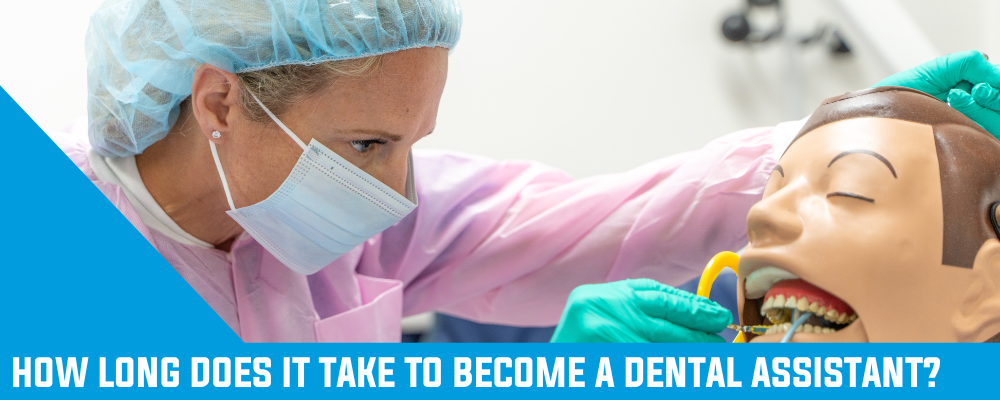Are you considering becoming a dental assistant? There are some great benefits of being a dental assistant. The job outlook is set to be much faster than average, and U.S. News and World Report ranked dental assisting as the 25th Best Health Care Support Job.[1][2]
But the best part of the job can be helping people smile again! No job is perfect though. It’s important to weigh the pros and cons of a dental assistant career before deciding if it’s the right choice for you.
Is Dental Assisting a Good Career Choice?
The answer depends on the person. If you’re fascinated by teeth or love working with people, then dental assisting could be a good career choice for you. But, if you’d rather spend the day in front of a computer, it’s probably not the best choice. Thinking about the different qualities of a career like job duties, salary, and work hours can help with deciding if it’s a good fit for you.
Dental Assistant Job Duties Pros and Cons
Dental assistants do more than help dentists work on teeth—though that’s a big part of the job! In many dental offices, a dental assistant’s job duties include answering phones, scheduling patient appointments, and handling patient billing and payment. They also prepare patient rooms for treatments, seat patients, assist with treatments, and sterilize instruments.[3]
A typical day can have them going back and forth from the front and back office to take care of these duties. It can be fast-paced, hands-on work.[4] The majority of dental assistants work full time hours. Over 30% work part time.[5]
Pros of Becoming a Dental Assistant
- Variety: Dental assistants do a lot of different things during the work day. So, their job usually isn’t boring.[6][7]
- Personal Satisfaction: Helping people have healthier, better looking smiles can be personally satisfying.[8]
- Active Work: Research has shown that sitting all day can contribute to heart disease and other problems.[9] Dental assistants get some exercise at work, for example by walking around the office and standing frequently.[10]
- Flexible Work Hours: Dental assistants can work full or part time. This flexibility can be good for working parents.
- Stress: A busy day filled with a variety of tasks can be challenging, fun work for many dental assistants.[11] U.S. News and World ranked the stress level for dental assisting jobs as average.[12] Still, some people might be better suited for a slower-paced schedule.
- Proximity to Patients: Assisting with procedures on patients’ mouths and teeth could be too close for comfort for some people.[13]
Dental Assistant Job Outlook
The Bureau of Labor Statistics (BLS) projects 19 percent job growth rate for dental assistants through 2026. Nationally, the job growth rate for all occupations is expected to be 7 percent.[14]
Keep in mind that in some states, the law requires dental assistants to be certified, licensed, or registered.[15] Employers also typically prefer to hire those with Dental Assistant Certification (CDA) from the Dental Assisting National Board (DANB).[16] . A DANB Salary Survey reported that Certified Dental Assistants made $2 more per hour than those who weren’t certified.[17]
Dental Assistant Salary
In May of 2017, the median annual wage for dental assistants was $37,630, according to the BLS.[18] How much a dental assistant makes can depend on factors like location, industry, job duties, experience, and credentials like training and certifications.[19]
Learn more about dental assistant pay from BLS.
Dental Assistant Training – Is it Hard?
Allied health training to become a dental assistant does not take as long as the education and training necessary to become a dentist. A dental assistant program (like the one offered at MTI) can take as little as 9 months, but a doctoral or professional degree in dentistry can take 8 years or more.[20]
Is Becoming a Dental Assistant Worth It?
Dental assisting can be exciting work in a growing allied health field. It’s a career that can offer advancement to those with the right qualifications and interest.
Maybe its greatest perk, though, is the satisfaction of helping people. If all of this sounds good to you, then a 9-month dental assistant program could be worth it.
To learn more about how to become a dental assistant, fill out the form below to contact your local MTI campus location.
Sources
-
[1] https://www.bls.gov/ooh/healthcare/dental-assistants.htm
[2] https://money.usnews.com/careers/best-jobs/dental-assistant
[3] https://www.bls.gov/ooh/healthcare/dental-assistants.htm#tab-2
[4] https://www.aol.com/2010/04/20/dental-assistant-jobs/
[5] https://www.bls.gov/ooh/healthcare/dental-assistants.htm#tab-3
[6] https://www.ada.org/en/education-careers/careers-in-dentistry/dental-team-careers/dental-assistant
[7] https://www.aol.com/2010/04/20/dental-assistant-jobs/
[8] https://www.ada.org/en/education-careers/careers-in-dentistry/dental-team-careers/dental-assistant
[9] https://www.entrepreneur.com/article/242254
[10] https://www.aol.com/2010/04/20/dental-assistant-jobs/
[11] https://www.aol.com/2010/04/20/dental-assistant-jobs/
[12] https://money.usnews.com/careers/best-jobs/dental-assistant
[13] http://learningpath.org/articles/Becoming_a_Dental_Assistant_Job_Description_Salary_Info.html
[14] https://www.bls.gov/ooh/healthcare/dental-assistants.htm#
[15] https://www.bls.gov/ooh/healthcare/dental-assistants.htm#tab-4
[16] https://www.danb.org/Become-Certified/Why-Certify-with-DANB.aspx
[17] https://www.danb.org/Become-Certified/Why-Certify-with-DANB.aspx
[18] https://www.bls.gov/oes/current/oes319091.htm
[19] https://www.bls.gov/careeroutlook/2015/article/wage-differences.htm
[20] https://www.howtobecome.com/how-to-become-a-dentist



